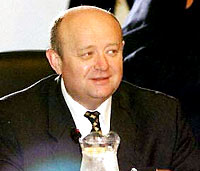
Russia's State Duma on Friday voted overwhelmingly to approve Mikhail Fradkov, nominated by President Vladimir Putin, as Russia's new prime minister.
In the 450-seat Duma, or lower house of parliament, 352 lawmakers voted for Fradkov, with 58 against and 24 abstentions. Fradkov needs a simple majority of 226 votes for his approval.
Lawmakers from the pro-Putin United Russia that holds 306 seats in the chamber voted for Fradkov unanimously as they had promised earlier.
Of those votes in favor of Fradkov, more than 300 belonged to United Russia, while the Liberal Democratic Party and part of lawmakers from the Rodina (Motherland) faction accounted for the remaining support votes.
Fradkov, a former tax police chief and Russia's envoy to the European Union, now succeeded his predecessor Mikhail Kasyanov who was fired by Putin on Feb. 24.
Putin unexpectedly dismissed Kasyanov's government almost three weeks before the March 14 presidential election that is set to see his landslide victory.
The head of state surprised the nation for the second time on Monday by naming the relatively unknown Fradkov as new prime minister to head the government, which is expected to be formed no later than next week.
With the consent of Duma on Friday, Putin is now to sign a decree appointing the head of the cabinet, and Fradkov will soon submit his proposal on the formation of the new government to the president, saying he would have only one deputy prime minister in the new cabinet.
"There will be one deputy prime minister" and "not very many ministries" in the new government, Fradkov said after the Duma voted him into office. Five deputy prime ministers had worked in Kasyanov's government.
Fradkov had asked the United Russia faction to delegate its deputy speaker Alexander Zhukov to the Cabinet as his deputy.
He proposed Friday to create a three-tier government structure, including the ministries, federal agencies and control and supervision bodies.
Fradkov will soon submit his proposal on the structure of the government to Putin after holding consultations with his aids.
The new premier also cited some prior tasks facing his government in the future, including boosting defense spending, improving scientific development, and strengthen social security and fighting against terrorism.
He pledged that his government would increase funding for defense industry contracts and defense-related research and development, in an effort to promote a breakthrough in the field.
Fradkov pointed out that the introduction of high-tech, innovative and scientific resources in the country's economy should be an important task in the government's work. He suggested that the country should adopt venture financing in the sector and ensure national protection of rights of intellectual property.
He also called on the government to strengthen the anti-terrorist campaign and work hard to assure people's safety.
It seems that Fradkov's future plans are quite in conformity with Putin's political ideas. It is said that the new prime minister, who is more cautious and controllable than his predecessor, will sincerely assist Putin in his second-term rein after the March presidential election.
(Xinhua News Agency March 6, 2004)
|

